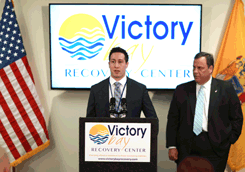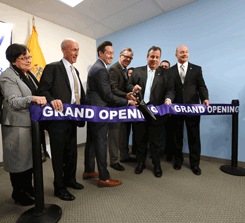Victory Bay Ribbon Cutting
Phaedra Trethan, @CP_Phaedra
Published March 2, 2017
GLOUCESTER TWP. – When Gov. Chris Christie asked what he could say about Haddonfield native A.J. Solomon’s addiction and journey toward recovery in his State of the State address in January, Solomon gave his former boss carte blanche.
“I’m an open book,” Solomon told Christie’s speechwriters.
“I just didn’t realize they were going to read the whole book,” Solomon joked as he introduced Christie Thursday at the ribbon-cutting for Victory Bay Recovery Center, an outpatient treatment center for those who, like Solomon, struggle with opiate and alcohol addiction.

“He has now learned a very valuable lesson,” Christie responded. “In dealing with me, if you say I can say whatever I want, I will say whatever I want. … But I think it’s an important story to tell.”
Christie’s seventh and final State of the State address Jan. 10 was largely focused on the issue of heroin, opiate and opioid addiction. He noted the state had a rate of heroin-related deaths more than double the national rate in 2016, and nearly 1,600 drug-related deaths. He outlined proposals for funding, treatment and regulations to combat what he called “a crisis which is more urgent to New Jersey’s families than any other issue we could confront.”
Solomon’s story was a central theme of the speech, and Christie noted that Thursday.
“The reason why I asked A.J. to speak about him in the State of the State, is that (addiction) can happen to anyone,” said Christie, a longtime friend of Solomon’s parents: Lee Solomon, a state Supreme Court justice and former Camden County prosecutor, and Dianne Solomon, a commissioner on the state Board of Public Utilities.
Christie called Victory Bay “a gift to the people of New Jersey,” and “a place where miracles on Earth can happen.”
The elder Solomon, who has largely declined to speak out on the issue of addiction because of his position on the state’s highest court, grew emotional as he told the gathering of media, friends and officials, including Senate President Stephen M. Sweeney, Gloucester Township Mayor Dave Mayer, Assembly members Gabriela Mosquera and Paul Moriarty, and others about his son.
“There is a hopelessness and a pain that you cannot describe, to watch your child go what he was going through, and not be able to help them,” he said. “… But the reason you get up every day and the reason you get up every day believing that you’re doing good is that you have a legacy, you have your children. It’s the reason why we live.”
He continued: “When you think you’ve lost them … sometimes you’ve lost them forever. It is something that almost … you can’t survive. But to be able to have my son back … for his mother and me, is life itself.”
The journey through addiction, relapse and ultimately recovery takes a toll on families, Lee Solomon said, offering prayers for other families affected by the illness.
“I’ve never been more proud of anything or anyone in my life than I am of A.J., right now,” his father said.
Victory Bay will offer intensive outpatient care and services, family support services, sober living placement assistance and intervention planning, modeled on what Solomon said were the methods he found most effective.

His sponsor and Victory Bay co-founder, Brent Reese, said Solomon was following an imperative shared by many who are in recovery: to help others trapped in addiction.
“When someone gets the fire of recovery in them, there’s no better feeling for me,” said Reese, in his 27th year of recovery. “There’s a process of identification. My family didn’t help me (get sober), my friends didn’t help me. It was the stranger who helped me, and to maintain my recovery, I have to do the same for others.”
Solomon said he was “very grateful and humbled” to have so many people at the opening, admitting, “A lot of people here don’t know the pain and harm that I’ve caused” while struggling with heroin addiction.
Recovering addicts “have to help others,” he said, to stave off their own feelings of helplessness and hopelessness that lead to substance abuse.
“I choose to live in the solution,” he said. “There is a solution to this.”